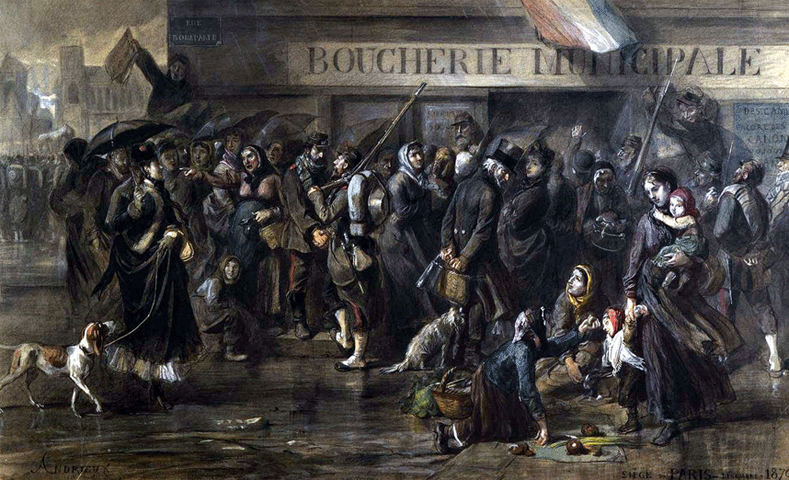A fictional account of the beginning of the siege of Paris from Emile Zola's novel La débâcle [ The Downfall ] (1892)
In this passage Maurice has fled to Paris to escape the Prussian army. Zola's character has been traumatized by French defeats, which he witnessed as a soldier. His unwillingness to accept the Prussian success makes him susceptible to the increasingly radical rhetoric of the leaders of the Paris Commune. Like many of the people who were actually in Paris durig the wintrer and spring of 1871, he was increasingly hostile to those French leaders who were willing to accept Prussian terms for a peace treaty. It is important to realize that Zola himself has a rather negative view of the radicals of the Commune and presents their arguments in a negative light. A few points that may not be completely clear from the passage itself:
|
The same movement that had swept away the Empire was now threatening the Government of National Defense, a fierce longing of the extremists to place themselves in control in
People waiting for scraps of meat at a bucher's shop during the siege Clément-Auguste Andrieux, The Siege of Paris, December 1870 (1870) |
order that they might save France by the methods of '92 ... Since they [i.e. the Government of National Defense] would not fight the Prussians, they would do well to make way for others, for those revolutionists who saw an assurance of victory in decreeing the levee en masse [i.e. drafting all able bodied men into the army] , in lending an ear to those visionaries who proposed to mine the earth beneath the Prussians' feet, or annihilate them all by means of a new fashioned Greek fire. Just previous to the 31st of October Maurice was more than usually a victim to this malady of distrust and barren speculation. He listened now approvingly to crude fancies that would formerly have brought a smile of contempt to his lips. Why should he not? Were not imbecility and crime abroad in the land? Was it unreasonable to look for the miraculous when his world was falling in ruins about him? Ever since the time he first heard the tidings of Froeschwiller, down there in front of Mulhausen, he had harbored a deep-seated feeling of rancor in his breast; he suffered from Sedan as from a raw sore, that bled afresh with every new reverse; the memory of their defeats, with all the anguish they entailed, was ever present to his mind; body and mind enfeebled by long marches, sleepless nights, and lack of food, inducing a mental torpor that left them doubtful even if they were alive; and the thought that so much suffering was to end in another and an irremediable disaster maddened him, made of that cultured man an unreflecting being, scarce higher in the scale than a very little child, swayed by each passing impulse of the moment. Anything, everything, destruction, extermination, rather than pay a penny of French money or yield an inch of French soil! The revolution that since the first reverse had been at work within him, sweeping away the legend of Napoleonic glory, the sentimental Bonapartism that he owed to the epic narratives of his grandfather, was now complete. He had ceased to be a believer in Republicanism, pure and simple, considering the remedy not drastic enough; he had begun to dabble in the theories of the extremists, he was a believer in the necessity of the Terror as the only means of ridding them of the traitors and imbeciles who were about to slay the country. . . .
As early as October the people had been restricted in their consumption of butcher's meat, and in December, of all the immense herds of beeves and flocks of sheep that had been turned loose in the Bois de Boulogne, there was not a single creature left alive, and horses were being slaughtered for food. The stock of flour and wheat, with what was subsequently taken for the public use by forced sale, it was estimated would keep the city supplied with bread for four months. When the flour was all consumed mills were erected in the railway stations to grind the grain. The supply of coal, too, was giving out; it was reserved to bake the bread and for use in the mills and arms factories. And Paris, her streets without gas and lighted by petroleum lamps at infrequent intervals; Paris, shivering under her icy mantle; Paris, to whom the authorities doled out her scanty daily ration of black bread and horse flesh, continued to hope--in spite of all, talking of Faidherbe in the north, of Chanzy on the Loire, of Bourbaki in the east, as if their victorious armies were already beneath the walls. The men and women who stood waiting, their feet in snow and slush, in interminable lines before the bakers' and butchers' shops, brightened up a bit at times at the news of some imaginary success of the army. After the discouragement of each defeat the unquenchable flame of their illusion would burst out and blaze more brightly than ever among those wretched people, whom starvation and every kind of suffering had rendered almost delirious. A soldier on the Place du Chateau d'Eau having spoken of surrender, the by-standers mobbed and were near killing him. While the army, its endurance exhausted, feeling the end was near, called for peace, the populace clamored still for the sortie en masse, the torrential sortie, in which the entire population of the capital, men, women, and children, even, should take part, rushing upon the Prussians like water from a broken dyke and overwhelming them by sheer force of numbers.
